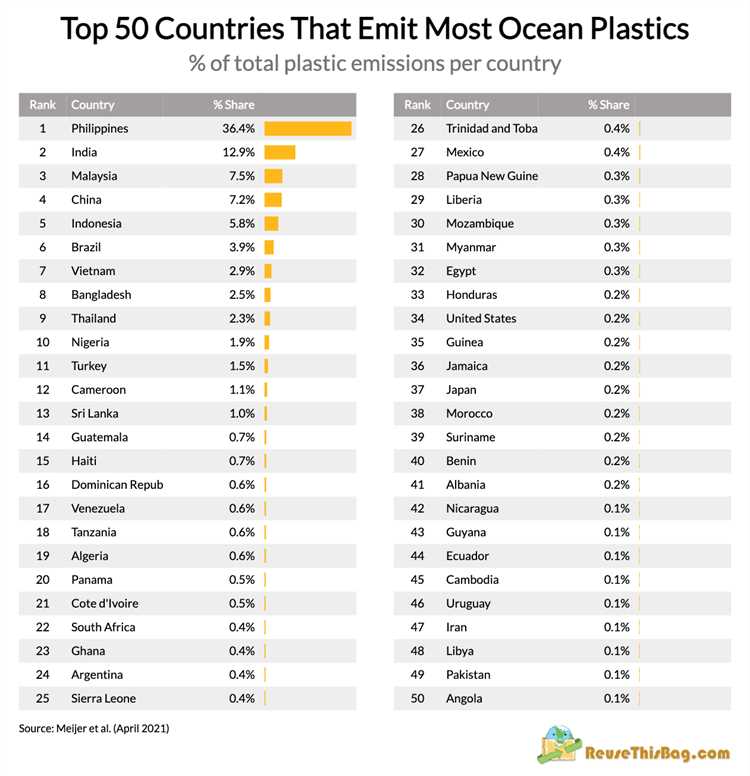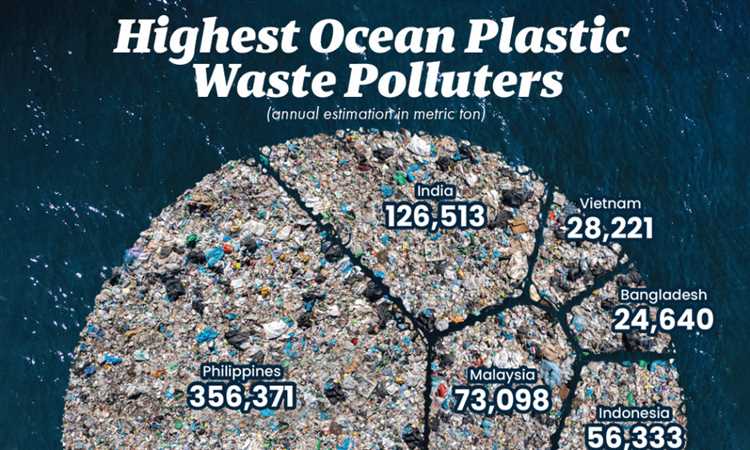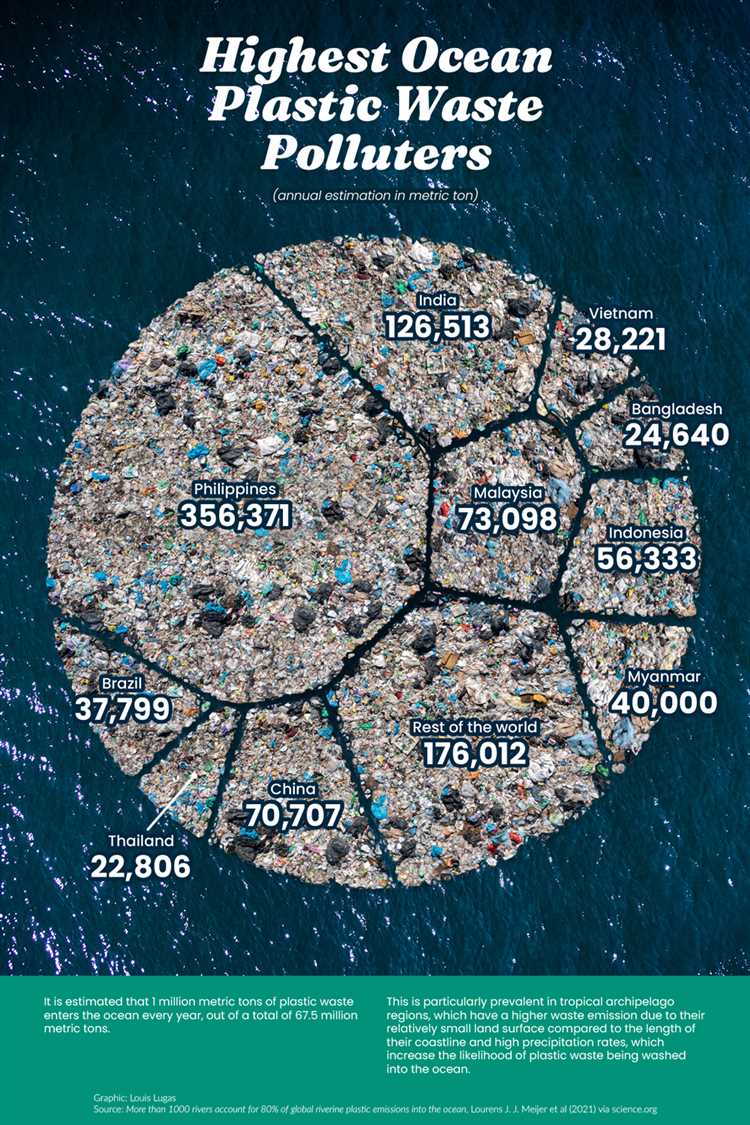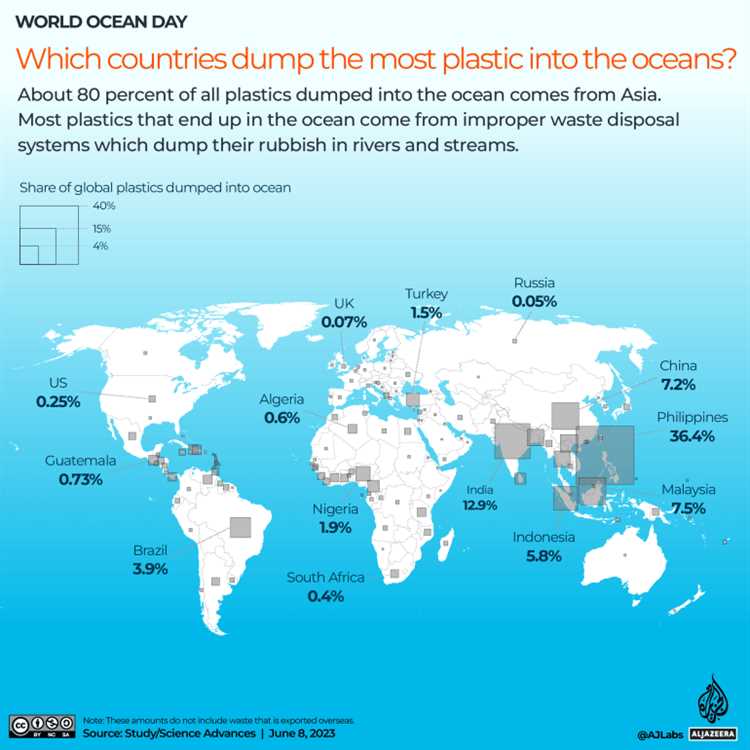
Plastic pollution has become one of the most pressing environmental issues globally. Every year, millions of tons of plastic waste end up in the world’s oceans, causing significant harm to marine life and ecosystems. However, not all countries contribute equally to this problem. Some nations have a much higher rate of plastic waste leakage into the sea than others.
According to a recent study, the top offenders in terms of plastic dumping in the ocean are primarily located in Asia. China, with its massive population and industrial activity, tops the list by releasing an estimated 2.3 million metric tons of plastic waste per year. Other countries in the region, such as Indonesia, the Philippines, Vietnam, and Thailand, also contribute significantly to the problem.
However, it’s important to note that plastic waste leakage is not solely an Asian issue. Western countries, including the United States and several European nations, also contribute to the global plastic pollution crisis. The study found that the United States ranks as the third-largest contributor, releasing around 0.9 million metric tons of plastic waste into the ocean each year. Various European countries, such as Germany, the United Kingdom, and France, also have substantial plastic leakage rates.
Efforts to address plastic pollution need to be coordinated globally. The problem requires both individual and collective action from governments, industries, and citizens around the world. By raising awareness, implementing effective waste management systems, promoting recycling, and reducing plastic consumption, we can reduce the amount of plastic waste that ends up in our oceans and protect marine ecosystems for future generations.
- The Global Plastic Crisis
- Mounting Plastic Waste
- The Impact on Ecosystems
- Overview of Plastic Pollution
- Top Contributors to Ocean Plastic Pollution
- China: The Highest Plastic Waste Producer
- Indonesia: The Second Largest Plastic Polluter
- Philippines: A Major Contributor to Ocean Plastic Pollution
- Thailand: A Growing Concern for Plastic Waste
- Vietnam: The Fifth Largest Plastic Polluter in the World
- Questions and answers:
- Which countries dump the most plastic in the ocean?
- Why are these countries the main contributors to plastic pollution?
- What actions are being taken to address plastic pollution in these countries?
- What are the impacts of plastic pollution on marine ecosystems?
- What can individuals do to help reduce plastic pollution in the ocean?
The Global Plastic Crisis
Plastic pollution has become a global crisis with immense environmental and human health consequences. The excessive production and improper disposal of plastic waste have led to the contamination of land, water bodies, and the oceans. This crisis has garnered significant attention in recent years due to the scale of the problem and its impact on ecosystems worldwide.
Mounting Plastic Waste
Plastic waste production has exponentially increased over the past few decades. According to recent studies, over 300 million tons of plastic waste are generated globally each year, with a significant portion ending up in the ocean. This unprecedented amount of plastic waste poses a severe threat to marine life, as marine animals often mistake plastic debris for food, leading to their entanglement or ingestion.
The Impact on Ecosystems
The global plastic crisis has devastating effects on terrestrial and marine ecosystems. Plastic waste not only pollutes the habitats of various species but also releases toxins that harm the surrounding flora and fauna. In addition, discarded plastics take hundreds of years to decompose, further exacerbating the pollution problem. The accumulation of plastic debris on beaches and the ocean’s surface has become a pressing issue, requiring immediate attention and action.
The Importance of Sustainable Solutions
Addressing the global plastic crisis requires the adoption of sustainable solutions at all levels. Governments, industries, and individuals all play a crucial role in reducing plastic waste and mitigating its damaging effects on the environment. Implementing effective recycling programs, promoting the use of biodegradable materials, and raising awareness about plastic pollution are some of the crucial steps towards a sustainable future.
In conclusion, the global plastic crisis is a pressing challenge that demands immediate action. By understanding the gravity of the problem and implementing sustainable solutions, it is possible to mitigate the environmental and health hazards caused by plastic waste. The future of our planet depends on our collective efforts to address this crisis and ensure a cleaner, healthier world for generations to come.
Overview of Plastic Pollution
Plastic pollution is a growing global concern that poses significant threats to our environment, wildlife, and human health. With its durable nature and widespread use, plastic has become one of the most prevalent types of pollution in the world.
Plastic waste is produced in large quantities and often ends up in our oceans. It is estimated that over 8 million metric tons of plastic is dumped into the ocean every year, causing immense damage to marine ecosystems. Plastic pollution can have devastating effects on marine life, leading to entanglement, ingestion, and overall disruption of the natural balance.
While plastic pollution affects every corner of the globe, certain countries are particularly responsible for contributing to the problem. Some of the countries that dump the most plastic into the ocean include China, Indonesia, the Philippines, Thailand, and Vietnam. These countries produce large amounts of plastic waste due to factors such as population size, industrial activities, and inadequate waste management systems.
Plastic pollution not only harms marine life but also affects coastal communities and economies. The presence of plastic debris on beaches and in coastal waters can deter tourism, reduce fishery productivity, and increase the risk of flooding by clogging drainage systems.
Efforts have been made to address plastic pollution, including international agreements, like the Basel Convention, and local initiatives to reduce plastic consumption and improve waste management. However, the problem persists, and it requires collective action and global cooperation to effectively combat plastic pollution and protect our oceans.
- Plastic pollution is a global concern that poses significant threats to the environment, wildlife, and human health.
- Over 8 million metric tons of plastic is dumped into the ocean every year, causing immense damage to marine ecosystems.
- Countries such as China, Indonesia, the Philippines, Thailand, and Vietnam are among the highest contributors to plastic pollution in the ocean.
- Plastic pollution affects coastal communities and economies by deterring tourism, reducing fishery productivity, and increasing flood risks.
- Efforts have been made to address plastic pollution, but global cooperation is needed to effectively combat the problem.
Top Contributors to Ocean Plastic Pollution

Plastic pollution is a global issue and is caused by various countries around the world. However, there are some countries that contribute significantly more to ocean plastic pollution than others. These countries are:
- China: China is the largest contributor to ocean plastic pollution. The country’s large population and rapid industrialization have led to the widespread use and disposal of plastic products, resulting in a significant amount of plastic waste entering the ocean.
- Indonesia: Indonesia is the second largest contributor to ocean plastic pollution. The country’s inadequate waste management infrastructure, along with its coastal location and large population, have contributed to the problem.
- Philippines: The Philippines is another major contributor to ocean plastic pollution. The country’s coastal areas are heavily populated, and plastic waste management practices are often inadequate, leading to a large amount of plastic ending up in the ocean.
- Vietnam: Vietnam is known for its beautiful coastline, but it is also a significant contributor to ocean plastic pollution. Poor waste management infrastructure and the prevalence of single-use plastics contribute to the problem in this country.
- Sri Lanka: Sri Lanka, an island nation, also contributes significantly to ocean plastic pollution. The country’s coastal tourism industry generates large amounts of plastic waste, and inadequate waste management systems are unable to handle the volume.
These countries, along with others, play a crucial role in the global effort to reduce ocean plastic pollution. It is important for them to implement better waste management strategies and promote alternatives to single-use plastics to protect marine ecosystems.
China: The Highest Plastic Waste Producer

China is widely recognized as the highest plastic waste producer in the world. The country’s rapid industrialization and urbanization have contributed to this unfortunate distinction. As one of the largest economies in the world, China’s manufacturing sector generates a massive amount of plastic waste.
The production and consumption of single-use plastics, such as packaging materials, plastic bags, and disposable cutlery, have risen dramatically in recent decades. The convenience and low cost of these products have made them popular among consumers and businesses alike.
However, the improper disposal and mismanagement of plastic waste have led to significant environmental consequences. China’s rivers, lakes, and coastal areas suffer from pollution caused by plastic waste, which poses a severe threat to marine life and ecosystems.
In response to this environmental crisis, the Chinese government has implemented various measures to tackle plastic pollution. It has introduced bans and restrictions on single-use plastics, encouraged recycling initiatives, and promoted public awareness campaigns on responsible waste management.
Nevertheless, the scale of plastic waste production in China remains a significant challenge. The country’s large population and its role as a global manufacturing hub make a comprehensive solution complex. Cooperation between the government, industry, and the public is crucial for reducing China’s plastic waste footprint and mitigating the environmental impact.
Awareness of the issue and the need for sustainable practices among businesses and consumers is vital. By promoting alternative materials, encouraging recycling, and implementing effective waste management systems, China can work towards reducing its plastic waste production and protecting the environment for future generations.
Indonesia: The Second Largest Plastic Polluter
Indonesia is the second largest plastic polluter in the world, with a staggering amount of plastic waste ending up in the ocean every year. The country’s geographical location, with its numerous rivers and coastline, contributes to this alarming problem.
One of the main reasons for Indonesia’s high plastic pollution is its large population and rapid economic growth. The country has a population of over 270 million people, and the demand for plastic products is on the rise. Unfortunately, the waste management infrastructure has not been able to keep up with this growing demand, leading to widespread plastic pollution.
Indonesia’s plastic pollution problem is further exacerbated by the inadequate waste disposal practices and low recycling rates. Many Indonesians still rely on burning or dumping their waste, which ultimately finds its way into rivers and eventually into the ocean.
Another major contributor to Indonesia’s plastic pollution is the improper disposal of fishing nets and gear. The country has a vibrant fishing industry, and the use of plastic-based equipment is common. However, when these fishing nets and gear are no longer usable, they often end up in the ocean, contributing to the plastic waste problem.
The Indonesian government has recognized the severity of the issue and has taken steps to address the plastic pollution problem. Various initiatives have been launched to promote proper waste management and increase recycling rates. However, much more needs to be done to combat this pressing issue.
Awareness and education campaigns are essential in changing people’s attitudes towards plastic use and disposal. Additionally, efforts should be made to improve waste management infrastructure and invest in sustainable alternatives to plastic products.
Indonesia must work towards a comprehensive and long-term solution to reduce its plastic pollution. By implementing effective policies and encouraging responsible consumer behavior, the country can make a significant contribution to protecting its marine ecosystems and preserving its natural beauty.
Philippines: A Major Contributor to Ocean Plastic Pollution
The Philippines is one of the leading countries contributing to the global issue of ocean plastic pollution. With its extensive coastline and high population density, plastic waste has become a significant environmental problem in the country.
The major causes of plastic pollution in the Philippines include improper waste management, inadequate recycling facilities, and a lack of awareness about the negative impacts of plastic on marine ecosystems. Plastic waste generated both locally and from neighboring countries often ends up in rivers and ultimately makes its way into the ocean.
Plastic debris not only poses a threat to marine life but also affects the livelihood of coastal communities in the Philippines. Many Filipinos rely heavily on fishing and tourism, both of which are severely impacted by plastic pollution. Fishing nets, ropes, and other plastic materials entangle marine animals, leading to injury or death. Moreover, the presence of plastic waste on beaches and in coastal waters deters tourists, affecting the local economy.
The Philippine government has taken steps to address the issue of plastic pollution, including the passage of the Ecological Solid Waste Management Act in 2000. This law promotes proper waste segregation, recycling, and composting. However, more efforts are needed to enforce these regulations and improve waste management infrastructure across the country.
Non-governmental organizations, local communities, and individuals are also playing a crucial role in combating plastic pollution in the Philippines. Cleanup campaigns and educational programs are raising awareness about the issue and encouraging sustainable practices. Additionally, initiatives focused on developing alternative packaging materials and promoting responsible consumer behavior are gaining traction.
Efforts to reduce plastic pollution in the Philippines require a collective approach involving government, communities, and individuals. By implementing sustainable waste management practices, promoting recycling, and raising awareness, the Philippines can make significant progress in reducing its contribution to ocean plastic pollution.
Thailand: A Growing Concern for Plastic Waste

Deteriorating Environmental Impact
The improper disposal of plastic waste in Thailand has led to an alarming deterioration of the environment. The country’s rivers and canals are becoming clogged with plastic debris, causing water pollution and negatively impacting marine life. This has resulted in the decline of fish populations and disrupted the delicate balance of ecosystems.
Plastic Waste Management Challenges
Thailand faces several challenges in managing its plastic waste. Limited infrastructure for waste management and recycling, combined with a lack of awareness and education about sustainable practices, has made it difficult to tackle the issue effectively. In addition, the country’s booming tourism industry has contributed to the surge in plastic usage and waste generation.
Government Initiatives
The Thai government has taken steps to address the plastic waste problem. In 2019, a ban on single-use plastic bags was introduced in major stores, and additional measures are being considered to further reduce plastic consumption and promote recycling. Environmental organizations and local communities are also actively involved in beach clean-up initiatives and raising awareness about the importance of reducing plastic waste.
Call to Action
Despite the efforts being made, the problem of plastic waste in Thailand continues to persist. It is necessary for individuals, businesses, and the government to come together and implement more sustainable alternatives and practices. This can include promoting reusable products, improving waste management infrastructure, and educating the public about the importance of reducing plastic consumption. Only through collective action can Thailand effectively address its growing concern for plastic waste and protect its natural environment.
Vietnam: The Fifth Largest Plastic Polluter in the World
Vietnam, a country located in Southeast Asia, has emerged as one of the largest plastic polluters in the world. Despite its natural beauty and vibrant culture, Vietnam’s excessive plastic consumption and inadequate waste management systems have led to a significant environmental crisis.
According to recent studies, Vietnam is ranked as the fifth largest contributor to ocean plastic pollution, following China, Indonesia, the Philippines, and Thailand. The country generates an estimated 1.8 million tons of plastic waste each year, with a considerable portion of it ending up in the oceans.
One of the main factors contributing to Vietnam’s plastic pollution problem is its dependency on single-use plastics. Plastic bags, straws, bottles, and packaging are commonly used and discarded without proper disposal. Insufficient waste collection infrastructure and recycling facilities exacerbate the issue, leading to widespread plastic pollution.
The impact of Vietnam’s plastic pollution on its marine ecosystems and coastal communities cannot be understated. Marine animals, including turtles, fish, and seabirds, suffer from ingesting or becoming entangled in plastic waste, often resulting in injury or death. Furthermore, plastic pollution not only poses a threat to the environment but also to human health, as harmful chemicals can leach into the water and food chain.
The Vietnamese government recognizes the urgency of addressing the plastic pollution crisis and has implemented certain measures to mitigate the issue. Efforts include banning single-use plastic bags in major cities, promoting recycling, and raising awareness about the importance of waste management and reducing plastic consumption.
However, more needs to be done to combat plastic pollution in Vietnam. This includes implementing stricter regulations, improving waste management systems, and encouraging sustainable alternatives to single-use plastics. Additionally, collaboration between the government, private sector, and civil society is essential to make a significant and lasting impact.
Overall, Vietnam’s position as the fifth largest plastic polluter in the world highlights the urgent need for action to combat plastic pollution. With concerted efforts and a comprehensive strategy, Vietnam can strive towards a cleaner and more sustainable future, preserving its natural wonders for future generations.
Questions and answers:
Which countries dump the most plastic in the ocean?
According to recent studies, the top five countries that contribute the most to plastic ocean pollution are China, Indonesia, Philippines, Vietnam, and Sri Lanka.
Why are these countries the main contributors to plastic pollution?
These countries are the main contributors to plastic pollution due to various factors, such as their large populations, lack of proper waste management systems, high rates of plastic consumption, and geographical location near rivers and coastlines.
What actions are being taken to address plastic pollution in these countries?
Several actions are being taken to address plastic pollution in these countries. They include the introduction of laws and regulations to reduce single-use plastics, implementation of waste management programs, community education and awareness campaigns, and the promotion of recycling and alternative packaging materials.
What are the impacts of plastic pollution on marine ecosystems?
Plastic pollution has detrimental impacts on marine ecosystems. It can harm marine animals through entanglement, ingestion, and habitat destruction. It also disrupts the food chain, damages coral reefs, and introduces toxins into the water.
What can individuals do to help reduce plastic pollution in the ocean?
Individuals can help reduce plastic pollution in the ocean by practicing the 3 R’s – Reduce, Reuse, and Recycle. They can also opt for reusable products, avoid single-use plastics, participate in beach clean-ups, support organizations working towards plastic pollution reduction, and spread awareness about the issue.